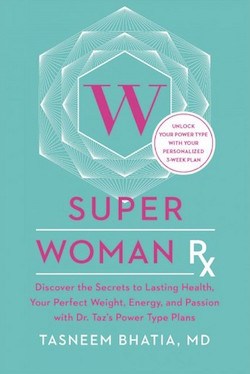The Sneaky Ways “Superwoman Syndrome” Can Affect Your Health

At 28, Dr. Tasneem Bhatia, MD's life was pretty fabulous—at least it seemed that way from the outside. After years of schooling, she had achieved her dream of becoming a doctor. But secretly, she was stressed out and exhausted. She developed cystic acne and her luscious hair started falling out in clumps. Every morning she would wake up not wanting to face the day ahead. What's wrong with me? she wondered. I'm in my 20s and should be thriving, not miserable.
When her background in functional medicine didn't help, she spent three years training in nutrition, Ayurveda, and traditional Chinese medicine. Her own little science experiment, she put all she learned to the test on herself. Through changing her diet and adding in a few key supplements, she was able to completely transform her health—and she wrote two books in the process.
"When you marry Ayurvedic medicine, Chinese medicine, conventional medicine, lab work, nutrition, hormones, body types, and personality, I saw that women were falling into very distinct silos," she says. "I spent five years tracking it and it would reproduce itself over and over again. It started to get really predictive."
The culmination of her observations (after meeting with over 12,000 patients) is her new book, Superwoman Rx, which helps women figure out their "power type" and its matching prescriptive plan. Spoiler alert: Regardless of which power type you are, chances are you have a case of "superwoman syndrome."

{{post.sponsorText}}
What exactly is superwoman syndrome and how is it messing with your health? Keep reading to find out.

What is superwoman syndrome?
"As women, we want to do it all and play multiple roles," Dr. Bhatia says. "But wanting to take on multiple roles can take a lot out of us and more energy than we might [have]." Behold, superwoman syndrome.
What does it look like, exactly? It's managing a team at work but secretly having gut probs. It's pursuing different creative outlets but hiding a crippling anxiety. Being a busy mom but struggling with maintaining a healthy weight.
"As women, we want to do it all and play multiple roles. But wanting to take on multiple roles can take a lot out of us."
"Every woman I meet is amazing," Dr. Bhatia says. "One woman might have created a beautiful family or community. Another might have created a company. It's important to own who you are and also important to understand the health risks that come along with continuing down your path because it's all tied together: our energy, emotions, choices, hormones, food, exercise, sleep, and partners. You need to have a plan so you can continue down your path with enthusiasm and longevity instead of crashing and burning periodically."

The five types of superwomen
Superwoman Rx includes a pretty lengthy quiz that tackles everything from personality traits to health issues—and even what your hair, nails, and tongue look like. And then the fun part: discovering your archetype. Here's a quick rundown:
Boss Lady: "My boss lady patients are known for their intelligence and wit, but the demands they place on themselves are what ultimately affect their health and happiness," the book spells out. It also says boss ladies are prone to IBS, reflux, constipation, joint pain, insomnia, and acne. Among her advice: Take a shot of apple cider vinegar daily to reset your pH, limit your dairy, and up your fiber and protein.
Savvy Chick: Dr. Bhatia describes savvy chicks as equal parts ethereal artist and commander-in-chief. But when out of balance, she cautions, the medical challenges—including anxiety, migraines, IBS, muscle tension, and insomnia—can be daunting. To counteract them, Dr. Bhatia recommends at a diet rich in vitamin B, iron, and protein.
Earth Mama: Caring and compassionate, Dr. Bhatia says earth mamas are natural caregivers. Because they often put their own needs last, weight gain, depression, diabetes, cardiovascular diseases, and hypertension aren't uncommon. Eating smaller, more frequent meals, more plant-based protein, and fiber while limiting carbs and sugar can help.
Nightingale: "Nightingales are motivated by a constant selflessness and sense of service," Superwoman Rx says. "In some ways, they represent all women and our longing to change and improve the world in some way, big or small." Saving the world can come with some not-so great side effects, such as a weak immune system, allergies, insomnia, and hormone imbalances. The Rx: Taking immune-boosting supplements like vitamin B and probiotics, sticking to an anti-inflammatory diet, and prioritizing sleep.
Gypsy Girl: "Imaginative, creative, and expansive, gypsy girls spend a lot of time in the air or in a creative space," the book explains. Some common conditions: anxiety, fatigue, hair loss, missed cycles, and insomnia. Among Dr. Bhatia's advice is to aim for 50 grams of protein a day, avoid gluten and other inflammatory foods, and prioritize sleep.

Your type changes over time
Just because you identify with, say, a boss lady archetype now, doesn't mean you'll be one for life. "There are so many roles we, as women, play as we traverse our 20s, 30s, 40s, 50s, 60s, all the way through," Dr. Bhatia says. Her point: It's important to check in with yourself every now and then. As your life phases change, so will your health needs. But at any age, avoiding burnout and maintaining balance comes back to self-care.
"As women, we have a really strong impact, so when we aren't the best version of ourselves, the ripple effect is on everything and everyone around us," Dr. Bhatia says. "We are all already superwomen. We just have to learn to take care of ourselves."
Regardless of what type of superwoman you are, self-care is important. Here are three rituals that are simple, yet powerful. And if you don't yet have a routine for yourself, you can always adopt Jennifer Aniston's.
Loading More Posts...